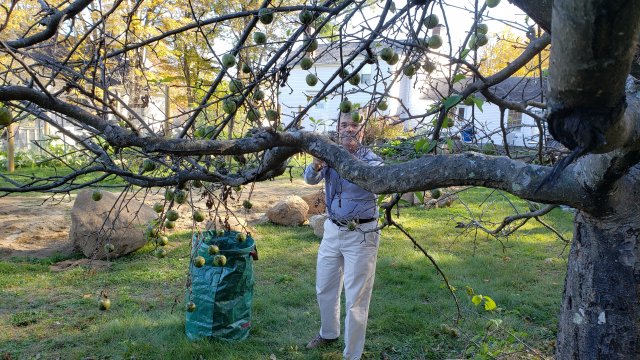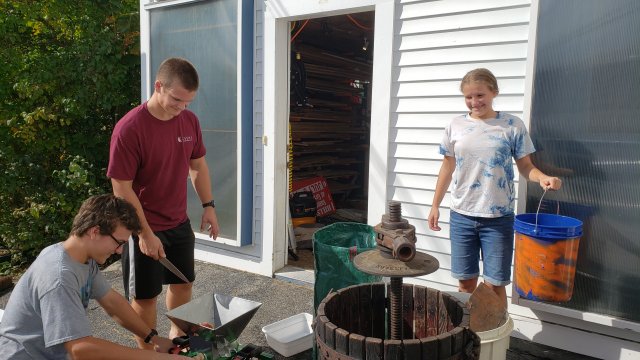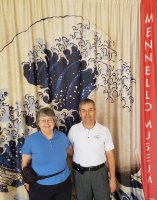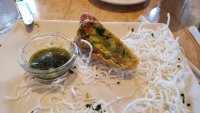My favorite Canadian lawyer has a weekly feature called "The Sidebar" in which he and American lawyer Robert Barnes spend an hour and a half to two hours interviewing very interesting people, most of whom I've never heard of. (No surprise there; I've never heard of most people.) I could enjoy these interviews very much, but that's a lot of time to give up so I usually resist. Recently, however, two caught my eye (ear?). It doesn't feel so bad if you can work on something else while listening.
The first interviewee was a large exception to my "never heard of him" rule: Scott Adams, of Dilbert fame. The second was unknown: Chase Hughes, behavior analyst, former military intelligence, interrogation expert, looks so friendly and innocent but is scary as all get out. I failed in my attempt to get any of his books from my usual free sources (library, Overdrive, Hoopla)—maybe they're considered too dangerous....
What links Adam and Hughes together is their interest in human behavior, persuasion, and hypnosis. They don't always agree; for example, while both are trained hypnotists, Adams insists that no one can be persuaded under hypnosis to do something against his own values, while Hughes says that's nonsense. For example, you can't directly make someone under hypnosis take off all his clothes in the middle of his workplace, but you can carefully lead him to believe he is about to step into the shower, and the logical consequences follow.
I don't have to like everything about these people and their ideas to find what they have to say both fascinating and frightening. I don't have to buy into their worldviews to acknowledge that what I believe to be free will choices are in fact far more vulnerable to influences we aren't even aware of than we can admit.
Perhaps more frightening than that is that both men agree that it is easy to make people remember as certainties things that did not happen. Implanting false memories doesn't even take a trained hypnotist, but can be done by a careless—or biased—questioner, especially if the subject is young, elderly, or otherwise particularly vulnerable.
Here are the interviews, for anyone who is interested and can find the time.
Permalink | Read 1146 times | Comments (0)
Category Random Musings: [first] [previous] [next] [newest]
Every time I get close to abandoning Facebook altogether, I find something worthwhile I probably would never otherwise have seen.
"Utilitarianism is being carried out to its logical conclusions; in the interests of physical well-being the great principles of liberty are being thrown ruthlessly to the winds. The result is an unparalleled impoverishment of human life. Personality can only be developed in the realm of individual choice. And that realm, in the modern state, is being slowly but steadily contracted."-
—J. Gresham Machen, "Christianity and Liberalism", 1923
Permalink | Read 971 times | Comments (0)
Category Random Musings: [first] [previous] [next] [newest]
Grace Victoria Daley
Born Sunday, October 24, 2021, 12:25 p.m.
Weight: 9 pounds, 9 ounces
Length: 20.5 inches
Mom, baby, and the whole family are doing well and are rejoicing with exceeding great joy over this delightful gift from God.
Still waiting for baby news.
In the meantime, David Freiheit has the best analysis (9.5-minute video) I've seen yet of the tragic accidental shooting during the filming of Rust. For a guy who claims to know very little about guns, Freiheit nails the two most important points that even I (with still greater ignorance) know about gun safety:
- Always assume a gun is loaded until you have personally checked it out, and
- Never point a gun at anyone or anything you aren't willing to destroy, even if you are certain it's not loaded.
How one is supposed to handle shooting scenes with actors, I don't know, but I'm certain there are standard safety protocols. In any case, the "accidental" shooting of someone in a theatrical scene is a basic plot device in countless murder mysteries, and it's a bit of a shock to find life imitating art.
One interesting thing I learned from this video: criminal culpability must be proved "beyond a reasonable doubt," but determining civil culpability only requires "beyond a balance of the probabilities" ("fifty percent plus one"). Now you know.
Permalink | Read 953 times | Comments (0)
Category Random Musings: [first] [previous] [next] [newest]
I'll admit it: I never like suffering. Especially suffering I believe to be unjust.
As a Christian, my greatest desire should be to be like Christ; however, there's a large part of me that would prefer to skip the suffering part.
Still, it happens. Not to the world-saving extent, but it happens, and I have to concede that good things often come from the pain. But in the midst of it all, it's awful, and that's when I like to return to one of my favorite passages from George MacDonald's The Princess and Curdie. (You can read the story free via Project Gutenberg. Or borrow it from your local public library, an important and underrated resource.)
The excerpt loses something out of context, since it misses both the reason for the pain and the good that came from it, but I find the image of the rose fire helpful when the pain feels overwhelming.
The room was so large that, looking back, he could scarcely see the end at which he entered; but the other was only a few yards from him—and there he saw another wonder: on a huge hearth a great fire was burning, and the fire was a huge heap of roses, and yet it was fire. The smell of the roses filled the air, and the heat of the flames of them glowed upon his face. He turned an inquiring look upon the lady, and saw that she was now seated in an ancient chair, the legs of which were crusted with gems, but the upper part like a nest of daisies and moss and green grass.
"Curdie," she said in answer to his eyes, "you have stood more than one trial already, and have stood them well: now I am going to put you to a harder. Do you think you are prepared for it?"
"How can I tell, ma'am," he returned, "seeing I do not know what it is, or what preparation it needs? Judge me yourself, ma'am."
"It needs only trust and obedience," answered the lady.
"I dare not say anything, ma'am. If you think me fit, command me."
"It will hurt you terribly, Curdie, but that will be all; no real hurt but much good will come to you from it."
Curdie made no answer but stood gazing with parted lips in the lady's face.
"Go and thrust both your hands into that fire," she said quickly, almost hurriedly.
Curdie dared not stop to think. It was much too terrible to think about. He rushed to the fire, and thrust both of his hands right into the middle of the heap of flaming roses, and his arms halfway up to the elbows. And it did hurt! But he did not draw them back. He held the pain as if it were a thing that would kill him if he let it go—as indeed it would have done. He was in terrible fear lest it should conquer him.
But when it had risen to the pitch that he thought he could bear it no longer, it began to fall again, and went on growing less and less until by contrast with its former severity it had become rather pleasant. At last it ceased altogether, and Curdie thought his hands must be burned to cinders if not ashes, for he did not feel them at all. The princess told him to take them out and look at them. He did so, and found that all that was gone of them was the rough, hard skin; they were white and smooth like the princess's.
"Come to me," she said. He obeyed and saw, to his surprise, that her face looked as if she had been weeping.
"Oh, Princess! What is the matter?" he cried. "Did I make a noise and vex you?"
"No, Curdie, she answered; "but it was very bad."
"Did you feel it too then?"
"Of course I did. But now it is over, and all is well."
Permalink | Read 972 times | Comments (0)
Category Random Musings: [first] [previous] [next] [newest]
My grandson persuaded me to take this personality type quiz because his own results matched so perfectly with his personality that he had his family rolling on the floor when he read it out loud. My own results (INFJ-T) were less spectacular: right on in places, but far enough off in others to make me wonder if it's really much better than a horoscope. But some of the questions were hard to answer, so I think I'll play with it and see if I can do better.
Speaking of better, my grandson then suggested I try Brandon Sanderson's Knights Radiant Order Quiz. My results from this one were much more impressive.
I am a Truthwatcher.
If you click on this link and scroll down a bit, you'll see the characteristics of a Truthwatcher, which as far as I'm concerned are pretty accurate. For example,
These make their opinions known loudly and forcefully, particularly if they think someone in power is abusing that power or lying about fundamental truths. ... They generally prefer to write their opinions rather than speak them.
Truthwatcher was my grandson's second guess as to what my results would be. His first was Edgedancer.
Truthwatcher and Edgedancer were the top two in my results, and pretty close at that. Considering that I also see myself as more of a mixture of Truthwatcher and Edgedancer, I think his Perspicacity rating is pretty good.
Now I just have to read the books.
Permalink | Read 1165 times | Comments (4)
Category Just for Fun: [first] [previous] [next] [newest]
My readers from Florida will recognize that even the best citrus juice you can buy in a grocery store is a pale imitation of the Real Thing. Standardization and pasteurization may make for a consistent product that can be safely transported all over the country, but what it does to the taste is almost unconscionable.
I'm here to tell you that the same thing is true of apple juice, and apple cider.
These days, what is sold as apple juice is slightly flavored sugar water. Process it just slightly less and give it the label "cider" and it's drinkable. Several years ago, when new regulations made it nearly impossible to get unpasteurized cider, this became true not only in Florida but for most of the rest of the United States as well. But I spent my childhood in upstate New York, where fresh apple cider was one of the greatest autumn joys. Unpasteurized, unfiltered, the flavor varying with the variety of apples pressed.
No one who has not experienced the difference can understand how much harm pasteurization does to flavor, be it of orange juice, cider, or milk. In the Live Free or Die state the orange juice is as bland as anywhere, but I've been enjoying fresh-from-the-farm milk, as I do in Switzerland.
And recently we made our own cider.
Picking.
Prepping.
Put it into the refrigerator straight from the press and you get an incredibly refreshing drink that explodes with the taste of fresh-picked apples. Let it sit on the counter for a day first and you get a slightly carbonated, slightly fermented drink reminiscent of Swiss apple cider.
I'm certain that letting it ferment longer would eventually give hard cider, then vinegar. But it always disappears before it can get to that point, even if we wanted to. :)
It's about time for another word from my favorite Canadian lawyer, who is struggling to balance principles and parenthood. (12-minute video)
Maybe it's a good thing that my only Australian source concentrates on cooking. I hear the situation is even worse there.
Permalink | Read 953 times | Comments (0)
Category Hurricanes and Such: [first] [previous] [next] [newest]
Southwest Airlines has been getting some bad press recently, but we've recently had a wonderful experience.
I'm very disappointed that they caved in to pressure to implement a vaccine mandate for their employees. I would have respected them much, much more if they could have held out against this wrongful policy.
That said, I was impressed, and pleasantly surprised, by what happened to us.
We were scheduled to fly Southwest, and more than a little concerned about their recent cancellations, especially the news stories of people waiting several hours to get help, and not being able to reschedule any sooner than three days away.
Sure enough, the night before we were scheduled to fly, we received notice that our flight was one of the ones that was cancelled. Before we could even get through to the Southwest website, however, we receive another notification:
We have rebooked your flight for you.
Not only did it happen quickly, and with no effort on our part, but they had actually put us on a better flight than the one that was cancelled. It left three hours later, giving us a more comfortable start, yet arrived at our destination an hour earlier, because it was a direct flight instead of requiring a plane change in Baltimore. True, our new flight was packed to the gills and we were among the last five people to board the plane, but at that point we felt nothing but gratitude.
Kudos to Southwest for making a potentially terrible situation into something almost pleasant.
And many thanks to all of you who prayed for our trip!
Happy Columbus Day!
(On my calendar it is October 12, no matter what the USPS says.)
If you don't celebrate Columbus Day, have a happy day anyway.
Permalink | Read 919 times | Comments (0)
Category Everyday Life: [first] [previous] [next] [newest]
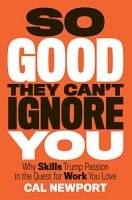 So Good They Can't Ignore You: Why Skills Trump Passion in the Quest for Work You Love by Cal Newport (Business Plus, 2012)
So Good They Can't Ignore You: Why Skills Trump Passion in the Quest for Work You Love by Cal Newport (Business Plus, 2012)
I can't resist a Cal Newport book. My first was How to Be a High School Superstar (published 2010), then Digital Minimalism (2019) then Deep Work (2016). If the advice in any of them is out of date, I haven't noticed anything major.
So Good They Can't Ignore You is—like the others—both strong and weak but filled with interesting ideas that are contrary to much conventional wisdom. This time Newport tackles the "follow your passion" philosophy of choosing a career that was popular when the book was written. I don't think the appeal of that idea has lessened, despite the great number of college graduates who thought they were doing just that but ended up with unmanageable debt and a job at Starbuck's.
Much of his thesis is just what used to be called common sense: The work you choose doesn't matter nearly as much as how you approach it; focus on what you can offer the world rather than what the world can offer you; work hard; cultivate excellence. If that sounds boring and Puritanical, read the book to find out how it turns out to be the secret to having a career that's enjoyable and personally fulfilling. Newport fleshes out the ideas nicely, if sometimes a bit too repetitively, with explanation, analysis, and real-world examples.
As with Newport's other books, this one is business-oriented, making it hard to apply directly to non-business careers like homemaking and rearing a family. In fact, part of me wonders if it's possible to do what's necessary to achieve the skills he expects without neglecting other important parts of life. However, it must be noted that the really intense effort he recommends works best when one is young, and leads to far more autonomy and flexibility than standard career paths. It is good for a man to bear the yoke in his youth.
At present, the Kindle version of So Good They Can't Ignore You is currently on sale for $3.99. It's well worth the investment of your time and money, or a visit to your local library.
Point 1: What is the good of euphemisms? They enable us to express something without resorting to offensive words (whatever the offense may be). That's better for the ears and hearts of the listeners, certainly. But does it do anything for the speakers? If I say "darn" instead of "damn," what do I gain? Is the attitude of my heart any better for it? I think that's a good question to ponder.
Point 2: As I've said many times, of presidents from both parties: our chief executive deserves respectful treatment by virtue of the office he holds—not to mention as a human being. Chanting "F--- Joe Biden" like a football cheer is puerile at best. Moreover, it's probably worse than useless, venting people's frustrations without driving them to work toward changing the policies they hate. If I were President Biden, I would hear those chants and think, "As long as they're shouting and not actively working for my opponents, I'm okay with that."
That said, I have to admit that I find the whole "Let's Go, Brandon!" story hilarious. And maybe even a little useful.
Good humor can be an effective antidote to hate, and it's hard to say, "Let's Go, Brandon!" without smiling.
My constant prayer since the start of the development of the COVID-19 vaccines has been that the knowledge gained would lead to an effective vaccine against malaria.
When I last checked the Johns Hopkins site, the total estimate of COVID-19 cases since we started keeping track have been a little less than 237 million. (Just how accurate that guess is, is another issue.)
In that time period, there have been approximately 382 million cases of malaria, a debilitating disease that cripples economies, and preferentially kills young children.
But there is good news. While there is still much room for new vaccine-development techniques to improve the situation, there is now a vaccine for malaria. It was developed by GlaxoSmithKline* and proven effective six years ago. Finally, after futher testing, has been given the green light for mass vaccinations in sub-Saharan Africa.
"Effective," in this case, is only 40%—I said there was room for improvement—and requires a series of four shots, given at five, six, seven, and 18 months of age. In a part of the world where health care is often less than stellar, I imagine this will be a challenge to implement. But malaria is a much trickier disease than, say, COVID ("comparing them is like comparing a person and a cabbage") and this is a huge milestone.
Last Sunday we might almost have been on vacation, with visits to one church, two art museums, and a restaurant. Double or triple the number of churches and museums and we could have been back in Rome. Even the temperature was about right.
The church was our own Episcopal Church of the Resurrection. It has no great art masterpieces, but the building is really beautiful and we get to sing there. :)
The first museum was the Mennello Museum of American Art. It's one of our favorite little museums, perfect for a quick cultural break. This time we stayed a lot longer than we had expected. The current special exhibit (through November 7) is "Floating Beauty: Women in the Art of Ukiyo-e." I've learned through experience that art exhibits that make political statements are likely to be annoying, and worse, boring. That's what I expected here and I couldn't have been more wrong.
Here's the description of the exhibit, taken from the museum's website:
Examines historical perspectives on women and their depiction in art in Edo Period Japan (1615 – 1858). Made up entirely of woodblock prints created in the ukiyo-e style, this exhibition highlights female characters in literature, kabuki theatre, and poetry; the courtesans and geisha of the Yoshiwara district; and wives and mothers from different social classes performing the duties of their station, in order to gain some insight into the lives of women in pre-modern Japan.
The prints, on loan from the Reading Public Museum, were beautiful, and educational. Several were by Utagawa Hiroshige, recognizable because of the book of his art I created for our grandchildren back in 2015. Even though it does not depict women, the exhibit included one of the many prints of Katsushika Hokusai's The Great Wave off Kanagawa. This is from the artist's series, Thirty-six Views of Mount Fuji, and immediately brought to mind our visit to Janet in Japan, where we took a long walk to another small museum with great richness of art, including the Thirty-six Views.
[Pandemic note: the website said we'd have to have our temperatures taken to enter the museum, but that wasn't true. They did, however, require masks inside.]
Our next visit was to the Orlando Museum of Art, across the street. Having been brought up on the Philadelphia Museum of Art, it has taken me a while to appreciate Orlando's, which, I'm sorry to say, tends toward art that is modern, infused with politics, and—as I said—boring. But every once in a while they have a major success in my book, and this was one of those times.
Two new exhibits opened September 25. There is no ending date posted on the museum site—it merely says "ongoing"—but both are on loan from elsewhere, and excellent, so be sure to check them out if you can.
The first exhibit we saw at the OMA was Treasures from the Museum & Gallery at Bob Jones University: Five Centuries of Old Master Painting. I had no idea Bob Jones had such treasure. This is such a change from what OMA usually has to offer! Another big plus for me was the excellence of the descriptions that accompany the paintings. All too often in American museums I find these commentaries to be poorly written: filled with spelling, grammatical, and compositional errors; sometimes, when it's a subject I know something about, even errors of fact. These were all I could want in that respect, and provided accurate explananations of both the Biblical/Classical context of the paintings, and the symbolism so often present in such works.
Van Dyke, Rubens, and Tintoretto are among those represented here. And also this, Carlo Dolci's Madonna and Child.
I wonder if anyone else in my family will do a double-take at Mary, as I did. You might want to click on the image to enlarge it.
The second special exhibit is Connoisseurship & Collecting: Masterworks of European Painting from the Muscarelle Museum of Art. More great masters, more excellent descriptions, definitely worth seeing. We could have spent more time with it, but we were tired out from the first two exhibits and hungry because it was now going on three o'clock. As we walked out of the museum, we paused to pay homage to their excellent collection of Louis Dewis works, now featured in a better place than the last time we were there.
[Pandemic note: "Face masks are encouraged but not required." As usually seems to happen in these situations, people's mask use and non-use were regulated by some pretty good common sense.]
The final work of art? Avocado egg rolls at the Cheesecake Factory.
[Pandemic note: It's a restaurant; we were eating. The servers wore masks, and we didn't.]
Permalink | Read 1210 times | Comments (0)
Category Everyday Life: [first] [previous] [next] [newest]
It causes all, both small and great, both rich and poor, both free and slave, to be marked on the right hand or the forehead, so that no one can buy or sell unless he has the mark. — Revelation 13:16-17
College is a time for wide-ranging, speculative discussions, and among my fellow students in the early 1970's this Bible verse was a popular topic. We were hard-pressed to imagine a world in which people would consent to having marks imposed on their bodies: tattoos were so rare that most of us had never seen one, and the now-common practice of implanting informative microchips in pets was 15 years in the future. The microchip itself had barely made any impression on our lives—my choice when doing my physics homework was between long, laborious hand calculations and a long trek through the snow to a small room where half a dozen chunky, very basic calculators had been made available to students.
Even more puzzling was how having or not having this "mark of the beast" could be the gateway to commerce. The marketplace still ran on cash and checks.
How much can change in 50 years.
Suddenly, in Canada, in Australia, in Switzerland, and in parts of the United States, the marketplace and much more are now gated by vaccination status. Society has been divided as by a sharp sword between the haves and the have-nots; the clean and the unclean; the ones who are free to travel, attend school, eat at restaurants, and even hold their jobs, and those who are not.
I am not saying that the COVID-19 vaccine is the Mark of the Beast. It seems clear that the Mark will involve some form of blasphemy and idolatrous worship, and this does not—although, frankly, the efforts to invalidate religious exemptions to vaccine mandates have me wondering a bit about that.
However, it is now crystal clear is that what seemed impossibly fanciful back in my college days is not only possible, but can sweep over even a free and democratic country with little effective opposition. Whatever that Mark may be, we have opened the door.





